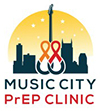Why is counseling and testing important?
HIV counseling and testing (C&T) is an important part of Street Works continuum of HIV prevention and treatment services. C&T is one of the main times when a comprehensive individual risk assessment is taken, making it the best opportunity for accurate referrals to more intensive services. C&T is also one of the primary entry points into prevention and other services. C&T uses short, client-centered counseling that can be effective in increasing condom use and preventing sexually transmitted infections (STIs).
Street Works uses a mouth swab (OraQuick) that tests cells from inside the cheek. With this method, results are available in 20 minutes, eliminating the need for a return visit for results.
What about rapid testing?
If a client’s tests is reactive, he receives a preliminary positive result. A second blood test (needle draw or OraSure) is required to confirm the result with a standard Western Blot. Final confirmation still takes 1-2 weeks. National data indicate that with rapid testing, 95% of clients who received a preliminary positive result returned for their confirmatory results.
Rapid testing has changed the way C&T is conducted, although clients can still opt to get their results later. Because the client needs to wait for 20 minutes for the results, the counselor has a “captive audience” for risk assessment and counseling. Rapid testing has dramatically increased the number of persons who know their results.
All HIV testing services should be performed using a testing strategy for a high or low HIV prevalence setting and using a nationally validated testing algorithm.
Street Works uses five key components—the “5 Cs”—that must be respected and adhered to by C&T services. These components are:
- Consent
- Confidentiality
- Counseling
- Correct test results
- Connection/linkage to prevention, care and treatment.
Mandatory, compulsory or coercive HIV testing is never appropriate and HIV testing should always be provided in a respectful, non-discriminatory and ethical manner, reflecting the professional integrity of the provider and respecting the human rights of the person being tested.
Recognizing the importance of disclosure to family members and sexual partners, many countries have also introduced “couples testing and counseling” where couples can learn their results together, with the assistance of a trained counselor or health worker. Sharing serostatus allows couples to plan, make important life decisions, including making HIV prevention choices, and to seek care and support together. Services targeting other groups have also been introduced, including for adolescents and people from key populations, such as services for sex workers, injecting drug users, and men who have sex with men and transgender people. It is imperative that these services are provided within a context of respect, non-discrimination, and protection of privacy and confidentiality.













